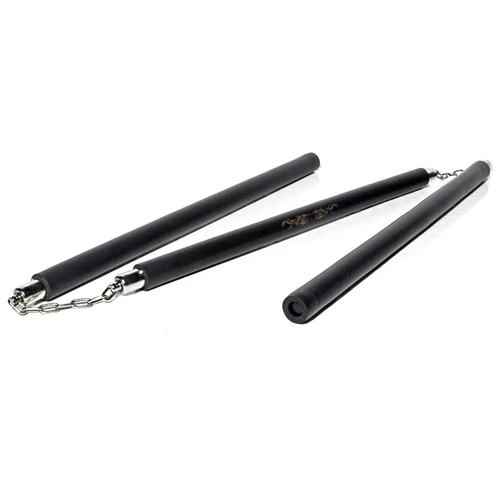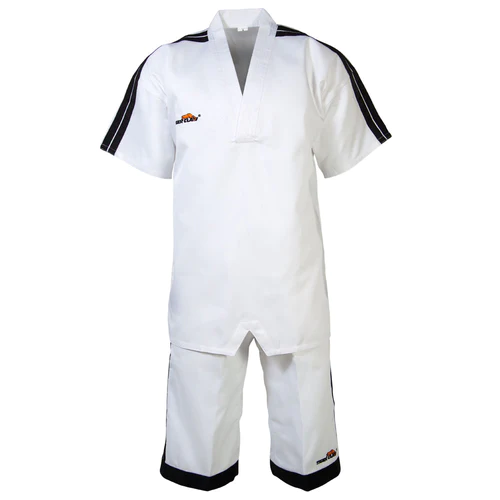 Grandmaster Stephen M. D. Chang started training in Shaolin 10 Animals style at the age of five and is a true sixth generation heir to the Shaolin Hung Gar style. He also teaches qigong, meditation and Chinese philosophy. His film and television credits, spanning over thirty years, include roles in FIRST BLOOD, X-FILES, HIGHLANDER, TWILIGHT ZONE and KUNG FU: THE LEGEND CONTINUES.
Grandmaster Stephen M. D. Chang started training in Shaolin 10 Animals style at the age of five and is a true sixth generation heir to the Shaolin Hung Gar style. He also teaches qigong, meditation and Chinese philosophy. His film and television credits, spanning over thirty years, include roles in FIRST BLOOD, X-FILES, HIGHLANDER, TWILIGHT ZONE and KUNG FU: THE LEGEND CONTINUES.
Peter Jagger: Grandmaster Chang, pleased to meet you, welcome to Birmingham. Can you give details of your background?
Stephen Chang: My background? I was born in Southern China - you had to learn kung fu because at those times, I as the eldest son in the family had to learn kung fu in order to protect my family, to help my father, and so I learnt it from a family background and I love it and when I went to Hong Kong I continued it there.
PJ: What kind of training do you do to keep in great physical condition?
SC: I think you should take this as part of your life. It's not a routine where you've got to exercise, go jogging. I just have to do it because I'm Stephen Chang, kung fu is part of my life, and if I don't do kung fu it's just like you get up without breakfast. So for the last thirty years I got used to it; that's why I look like this. I'm not a young man by the way. I'm not going to tell you how old I am but I feel great.
PJ: Do you train everyday?
SC: I don't say I train everyday, I do it everyday. There's a difference between train and doing - it's part of my life.
PJ: I understand Bruce Lee lived in the same neighbourhood while you were growing up in Hong Kong. Can you share any recollections that you have of this time?
SC: Yeah, when we were little we lived in the same neighborhood, but we didn't know each other until we went to school. He was about three or four grades higher than mine, and after school we didn't want to go home, but like any kids we'd sort of hang out, we'd play marbles, we'd play soccer and we'd practice kung fu. So, it's like a buddy. At those times we didn't know the future. If I'd known he would be the future famous Bruce Lee, I would train with him much better. But we didn't, so we sort of played like a neighborhood kid, just wanted to stay away from home as long as we could and that's how we got into the training, the playing, sort of like buddies.
PJ: Did you and Bruce Lee have any street fights?
SC: Oh, I tell you that, we had to because we two were little. Bruce Lee wasn't big, ok, I wasn't big. So, sometimes the bigger fellows came over, one took our bike, one took our money, the money I'm talking about a couple of pennies, worth a lot of money at those times, and we had to defend ourselves. So what we did, thought if we cannot fight, we ran, and usually Bruce Lee ran faster than I am.
A couple of times, Bruce Lee was so strong that the two of us kept fighting about three or five people. One day, I remember we used a bicycle. There was five big guys confronted us, we had one bicycle, so what we did, Bruce Lee hang on to that and I did a kick and the bicycle just went way into the guys and then they fall down. We ran and we took the bike. So that was a fight I can never forget. If we did not have a bicycle we would not be able to fight against five people.
PJ: Do you have any memories of Bruce Lee's parents?
SC: His father was a well-known, I cannot say famous, a well-known actor in China back in the fifties. Those times they were black and white, very poor sound, so I watch his parent's movies, but you know, we didn't really get involved with his parents very much.
PJ: By the time he was eighteen, Bruce Lee had appeared in over twenty films in Hong Kong. Did this bring him "superstar" status among the other children/youths? Did Bruce Lee boast about being in so many films?
SC: Actually, like I said, his father was an actor first and obviously brought his son Bruce Lee into the films, and Bruce Lee had another younger brother. But Bruce Lee was the only one that was getting involved in the films. The other brother was a study kind of person, studied at school. So, Bruce Lee actually did a lot of films. I remember in one of the films he was playing an orphan, and at that time he wasn't doing much kung fu until later, so more dramatic roles, played somebody's son and he was a good actor. In those times, in those black and white films, we don't really like actors. The Chinese tradition of family considered actors and singers not a good profession, a street kind of job, we did not really like actors at those times but he was a good actor, I must say that.

PJ: In those childhood films, Bruce Lee became known as Lee Siu Loong (Little Dragon). Did you know him by this name?
SC: Oh yeah, he was famous by that name. His real name is not Lee Siu Loong, and if you talked about his real name, nobody knows; but if you say Lee Siu Loong, "Oh, yes". Lee Siu Loong, "Lee" is his family name, okay, Mr. Lee, "Siu Loong" - Little Dragon - and he was very famous. I called him "Big Brother." ... Lee Siu Loong was famous in the world. I would say in the whole world there were two persons that everybody honor even after they die: Elvis Presley in the West and Lee Siu Loong in the East. So, Lee Siu Loong is very, very famous.
PJ: Bruce Lee himself stated that from boyhood to adolescence he was mischievous and aggressive. Is that also your opinion of the young Bruce Lee?
SC: Bruce Lee was a typical bad street kid. I remember when we were so little he stole some money from his mother's wallet and he was punished. I remember that because he ran away from the family and we played and he was really upset. At those times the parents worked so hard just to get enough for the family food so they didn't spend time to educate their children. So, we spend most of the time grew up on the street, did whatever we could, beg, steal, borrow, whatever, and he was a typical bad kid, and most of us were at those times because it was difficult times and that was natural to us. You might call us bad but to us it was survival. Yes, he was bad.
PJ: Bruce Lee began training in Wing Chun in 1954. Did you have any idea back then that Bruce Lee would achieve worldwide recognition and success?
SC: Wing Chun? Ok, good. I know this more than anybody else. Bruce Lee started with a lot of weight training. When we say weight training, we did not have weights. You know what we did? We put two blocks of cement with a stick and we used that to do weight training. But life was hard, I told you, and then he did a little boxing and then later on he learnt Hung Gar style, the same style that I studied - Shaolin Hung Gar style, the animal style - but he liked Wing Chun because Wing Chun was something simple to learn, but he invented his own Jeet Kune Do through Wing Chun, so he was a smart kid. Jeet Kune Do meaning the way of fighting, no system, no style, just comes and goes without a formality, that's what makes it famous? But Jeet Kune Do was transformed from Wing Chun.
PJ: It has been reported that while living in Hong Kong, Bruce Lee experienced confrontations with the Triads. Are you aware of any such incidents?
SC: Oh definitely, you know. Like I said, in those times there were Mafia, Triads, we call it the Black Society, and they sort of made you join their society and they sent you out to earn money through illegal ways. Yeah, Bruce Lee, he was too proud to be kicked into a club like that, he wanted to be the boss, obviously a lot of confrontation, and I remember one day that we were attacked without any warning. Bruce Lee was sitting in the park after we played soccer, he was tired, and suddenly someone attacked him from the back and he got knocked down. He got up, fought with the guy, the guy was so huge, knocked him down, he got up again, knocked him down until the big guy was totally exhausted, then Bruce Lee "bang, bang, bang, kepow!" beat him up. So I was really impressed by Bruce Lee's energy inside, he never got defeated, invincible - that's the word I want to use.
PJ: In 1958 Bruce Lee became inter-school boxing champion at St Georges School, Hong Kong, defeating three-year defending champion Gary Elm. Do you know anything about this encounter?
SC: Yeah, I remember that actually, it was big news. People don't believe that Bruce Lee could beat anybody because he was little, smaller than me. He was just 5 foot 6 or 7, and I am 5 foot 9 or 10, so I was taller than him but his muscle was tight, really tight, and nobody think that Bruce Lee can defeat a guy like that? He defeated that guy because in his mind he has such a high determination, he wanted to beat the guy and he did and that became big news.
PJ: I understand Bruce Lee did not want to leave Hong Kong but because he was getting into so many fights, so much trouble, his parents decided that it would be best for him to have a new environment. Do you know anything about this particular time in Bruce Lee's life?
SC: Bruce Lee was typically having trouble in school. The teacher didn't really like him, he almost got kicked out, but somehow he stayed and he had a lot of trouble with the gangsters, with the neighborhood, those people that were defeated by him. Sometimes on the street, if you knock somebody down, they take up revenge, the Triads, the Black Society, and he wasn't really concentrating in school as the way his father wanted. His father wanted him to study philosophy. So at those times, everybody wanted him to go out, to get away from those bad surroundings. He went to San Francisco, then he started school in Seattle, in a garage, somebody's car garage, he taught Wing Chun at the same time I was teaching Hung Gar in Vancouver. It's only about one hundred miles away, so I would drive to Seattle to visit him.
PJ: How much contact did you have with Bruce Lee after he left Hong Kong in 1959 for the USA?
SC: Not very much because, like I said, we left about the same year as he went to open school in Seattle, I went to Vancouver for my kung fu school. Then, after a while, we suddenly heard his name in one of the television episodes called The Green Hornet, his name was Kato, he was the driver for another actor, both of them wore masks with a hat, like a professional chauffeur, and they had a lot of action, fighting, it's called THE GREEN HORNET, it was very famous for that time.
 PJ: Were you inspired by Bruce Lee? If so, in what way?
PJ: Were you inspired by Bruce Lee? If so, in what way?
SC: I am inspired by him. Not only that, I just look him up like a big brother, like my mentor. I learnt one thing from him: if you get defeated or knocked on the ground, don't stay on the floor, get up right away and face it again until the other guy is defeated. Psychologically, physically, he had a lot of endurance. This guy, like I said, you know, he had a lot of energy inside; you think he's down but he's getting up, just like a wild tiger, that's why we called him Lee Siu Loong, Little Dragon.
PJ: I understand that Bruce Lee came first and you came second in a contest. What was the contest?
SC: Oh yes, like I said, we started doing some weight training when we were little. Our parents always, "Why don't you go to school and study? What are you doing?" So we used to run into the backyard and lift the weights. He started first, he lift ten times. I'm not going to do ten times; I only made eight. Then when we had a little money we joined a weightlifting club. We called it bodybuilding, and we started training very seriously, and in those times in Hong Kong very few people trained, because most people couldn't afford it. There were people who walked on the street bare feet, shirtless, hardly any food to eat, so who could afford to join a club and do weight training? So, for those who do bodybuilding, weight training is like a superman, and we went to join a thing called the Mr. Hong Kong Contest, and Bruce Lee at that time was really big, he came number one, we call it Mr. Hong Kong Title, and I was number two, and those were young ages, look at how young [Shows a photograph of himself at that time]. I wasn't bulky but I was very, very elegantly built; it's not like Arnold Schwarzenegger, big guys. That was a time I feel very honoured, very proud.
PJ: You starred in a national TV commercial as Bruce Lee. Can you give details?
SC: OK, I understand what you mean now. In 1978 in Hollywood, one director was trying to make a TV commercial. At that time we called it Coca Cola, now we call it Coke. They wanted to make a TV series. They couldn't do that, so they changed their minds and did the TV commercial and Bruce Lee had already died. Let me tell you a bit about Bruce Lee's death. A lot of people ask me, "How did Bruce Lee die?" I've been asked hundreds of times, maybe a thousand times over the last thirty years. Let me tell the world one thing. Bruce Lee would never die for one obvious reason. He died for many, many reasons. Now it's time for me to tell you, first of all, he trained too hard. He doesn't rest. When he's tired, he's got to take something to stay training. A person, for example, if a person can only go up to the tenth floor, that's his limit, the time to stop. He will stop. But he didn't. He went up, on and on until such time he cannot go no more. Like a car, if you keep running without stopping to refuel the gas or put some water and check the tires, even a brand new car will break down, right? A human has certain limitations. If anyone went beyond that human limitation, if you keep going, you are going to collapse. If you don't want to collapse, what happens, you are either going to take some pills, steroid or something. Secondly, in our business, over-sexed. Thirdly, in his life, he had a lot of fights. If Bruce Lee hit somebody ten times, somebody is going to hit him back three, four, five times, right? You can't just hit somebody; somebody's going to hit you back. So, over the last ten years Bruce Lee has been build up by the impact from all the kicks and punches to some part of his body - to hurt the lung, liver, heart, we call it internally. If you do not know and keep going, you are physically strong but your heart and liver has that kind of shock impact, you know what I'm trying to say? Over the years after year after hundreds of kicking and punching, your organs inside will actually deteriorate, weaken up, which we don't realise because we do not have this kind of medical doctor or family doctor or regular or yearly check-up, no way. So, over-sexed, over-train and over your human limit and the injuries accumulated over the last years and then one day that human cannot stand up no more and they collapse. So, those are the reasons and I would say reasons and reasons and reasons. That's how he died; otherwise, Bruce Lee could never die from one single reason, because we were tough.
PJ: How many films have you made?
 SC: I would say movie, TV series, short films, commercials, altogether, eighty of them.
SC: I would say movie, TV series, short films, commercials, altogether, eighty of them.
PJ: Have you ever played any comedy roles?
SC: Yeah, we did one comedy called DOUBLE HAPPINESS. It's a drama comedy. I starred with Sandra Ho, a Korean actress who won the best actress in 1977. That movie was funded for eight hundred thousand dollars, we made four million that year, and I got pre-nominated for best actor and she won the best actress, 1994 was the year. We won seven international awards, seven of them. In the same year we won two Genie Awards, so it was a very good film, called DOUBLE HAPPINESS, you can rent from video store or you can go on my website www.grandmasterchang.com, go to my movie clip, you have eight movies, and you can see the intro which is about five to ten minutes of my eight movies for free.
PJ: Which acting school did you attend?
SC: Acting School? Couldn't afford it, never did. I believe that the acting school would help if you weren't born an actor, this would help on paper. It's like Bruce Lee never went to acting school; we're born actors, we have something inside. Otherwise, stay behind the camera because I've seen some actors, they went for auditions, they read so well, when they go inside, the director will say, "Action", they pee their pants! They just black out. To me, I love the camera; you've got to dance with the camera, love the camera, work with the camera. So, acting school? Not in my life. Sorry.
PJ: Have you been involved in the making of films from behind the camera?
SC: Behind the camera? No, no, I've never tried to produce or direct. I'd like to be an actor for the next ten years until one day I'm experienced enough. Maybe I'd like to direct my own movie. I have a movie called "International Godfather." I'd like just to give you a little idea, it's my own script. I start from the Roman soldiers' stage who crucify Jesus Christ and then I start from the first Emperor of China in early stages back to a thousand years ago. They're two parts of the world and these two kingdoms disappear in history ? and then a thousand years later the Sicilians in Italy want to restore their honour so they build up something in a different way called the Godfathers, the Mafia, and in China at the same time they had the Black Society, like we just said with Bruce Lee, you know, so then how do they develop into two strong Mafia and, anyway, I'd like to direct that movie. Give me a few more years and now I've written a script up to eighty-four pages and I've registered with the American Writers Guild already. It's going to come. One day you're going to see Stephen.
PJ: What was it like to work with David Carradine?
SC: Ladies and gentlemen, let me introduce you to David Carradine [shows a picture of himself with David Carradine]. We know that David Carradine had a long series, four years of KUNG FU: THE LEGEND CONTINUES. Actually, Bruce Lee was supposed to play David Carradine's role but for some reason they chose David Carradine. So Bruce Lee was very upset about it because he's not a real Chinese. The real reason behind it is some dispute - I don't want to get into that. I engage in one of the episodes called the "Shaolin Treasure." They auditioned me from a videotape in Canada, sent it to Toronto, they called it the Warner Bros Hollywood, the other one is Warner Bros Canada. I played two roles? They didn't shave one inch of my hair. Remember David Carradine had long hair on the shoulder? So we both sat on the chair, they just sort of put your hair back with some water and then put it up, put a plastic cap on it and put some powder and some glue. They keep doing that until the hat and your face matches the colour and every morning I've got to spend forty-five minutes to get my hair done like that, and it took David Carradine an hour and a half. Why? Well, he fell asleep once in a while. He was the star and he was the producer, so he got away with it. I played two roles. I played an old monk, eighty-five years old, and then forty-five years later I played the old monk's son. So I played father and son in one episode. David Carradine plays his father as well.

PJ: You also worked with Sylvester Stallone in FIRST BLOOD. What was it like to work with him?
SC: Well, it's a long story I want to tell the world; they don't know about this. The FIRST BLOOD, number one, supposed to be finished within one month, but they actually delayed it for six months. Let me tell you something. One morning when we got up, all the ammunition had gone, the guns, had all gone, disappeared. So how can we do the film? So we had to report to the insurance company and it took about two weeks to replace them, about three hundred dollars worth of ammunition? Sylvester Stallone's FIRST BLOOD ammunition was stolen. We suspect it was smuggled into the United States. Disaster number one. Secondly, when we were filming, the scene was in Vietnam, right? Rambo. Suddenly in Canada snow comes down. We've got to shut down because there's no snow in Vietnam, am I right? So we rest for another few more days, then-- Remember the helicopter scene when Sylvester was running and the helicopter was chasing and he had to run and jump down to the cliff? He did and broke four ribs. So, we've got to rest for another two weeks. Normally it would take two months, but Sylvester Stallone said, "I'm ready in two weeks." Four ribs! So instead of one month it took us six months to produce and it's over budget. So they spent about ten million dollars in 1981, they made double? I played the Vietnamese commander who captured Sylvester Stallone, questioned him and tortured him. Remember the scene, the officer came over, questioned him and finally, using a knife, cut across his chest. He was tied up there and screamed. I was that officer. You might say, "Hey, Stephen, you played a bad guy." Yes, to the Americans, to Rambo, I was the bad guy; but to Vietnam, I was the patriot. I defended my country; he was the invader. So you can say good or bad, from the movie side of it, it depends on what angle you're looking at. So, I was a good guy in Vietnamese country.
PJ: Which of the films that you have appeared in is your favorite and why?
SC: My favorite? Well, I would say DOUBLE HAPPINESS still, because in that I was the male lead actor, we won seven awards and I believe that if you want to win an Oscar, an Academy Award, to win an award they are looking at your dramatic action, not gunfights, not too much fighting. So, I learnt something. If I stay with the kung fu movie or action movie - like TERMINATOR for example - it's great, but there's not a lot of dramatic action where people can see you're a good actor because they're focusing on the guns and the fighting. If you go into dramatic, sometimes you have to cry, you have to laugh, you have to really show yourself inside, and with that you have a chance of getting nominated and winning an award. So I would like to do more dramatic roles, especially as I'm getting older, and you learn more when you have more acting than action. So acting or action? I've done too many action; I want to do more acting acting, you get it?
PJ: Is there any actor or actress in particular that you would like to work with?
SC: My wife won't like it. Pamela Anderson. BLONDE AND BLONDER - that film, I went to audition, I'd love to work with her. First of all, not only because she's sexy but also she's a Canadian and I'm a Canadian. We're just a few hours away drive by boat. Wherever Pamela Anderson goes, there's always a riot, chaos, and she's funny. I'd like to work with her someday.
PJ: You are fluent in English, Japanese, Spanish, Italian and five Chinese dialects. You are a fund-raising singer and performer for UNICEF, International Lions Clubs, Rotary Clubs and many other world organizations.
SC: Man, I was flattered by that. You must study my history pretty well. Being an actor, being a true actor, you want to have more jobs. Not only you can speak English - I'm speaking American English - I'd like to learn some British English so I can work in UK, okay? I speak Japanese so I can play a Japanese role. I can play Vietnamese, I can play Korean. So I have to learn language. My Italian role was ridiculous, but they hired me to play the Italian-speaking Chinese fisherman. In the United States there's more Mexicans, so they have to learn how to speak Spanish. So it helps because, when I audition, the director wants to see an actor very versatile, and I like languages. I promise you, next time you interview me I will speak British English - Cheerio!
PJ: What has been your most satisfying accomplishment?
SC: Well, I would say today is a big accomplishment. I never thought I'd be invited to this convention. I came to London, England - this is my fourth time - I worked with Steven Seagal, I worked with Sylvester Stallone and I did one British and French movie called LA TURBULENCE DES FLUIDES - The Turbulence of the Fluids. It's like a science fiction movie funded by Paris and London. In this film I play a Japanese C.O., dress up, black suit, very powerful person. I love UK. The British talking is so gentle and they're polite and I like the food, breakfast was good, and I just love the people. In Hong Kong, remember Hong Kong was a British Colony, I've been educated there. My teachers were all British.

PJ: What are your plans and goals for the future?
SC: I don't know how much future I've got but I'd like to have a good future? I'd like to maybe spend some time in the UK teaching kung fu. I'd like to open a school - nowadays too many karate, taekwondo, jiu jitsu, there's not very many real kung fu, and what I teach is the real animals kung fu, the five animals and five elements which is the original from the Shaolin Temple. My master passed away. He couldn't speak English, therefore he refused to teach non-Chinese, and I was the last surviving disciple that can carry on and develop and spread out his seed. If I don't teach, after I disappear, the art has totally gone, that's a shame. So, hopefully in the UK, somebody can sponsor, organise or maybe I can do a short course, come over to teach, and also I'd like to do some British films and I'm looking for an agent. I have my thirty years of experience, I'd like to work with a British film in any way, in any capacity, and if any director or film company would like to give me a chance, I would like to prove to them that Bruce Lee is still alive, he's still there but through a different person.
PJ: Grandmaster Chang thank you for taking the time to talk with me; it is greatly appreciated.
SC: Thank you so much. I'm looking forward to seeing the people in the UK - adios, cheerio, sayonara.
Later in the day, while addressing an audience, Grandmaster Stephen M.D. Chang added, "Bruce Lee was my big motivator, because after school we two used to hang out. People don't like me, people didn't like Bruce Lee, because they thought we were arrogant, we looked arrogant. We were not, we just had a different mentality. So, one day Bruce Lee and I looked at each other. At first we don't want to talk to each other, we have our pride. One day we have nobody to play, we, ?Hey, do you want to play?' So, we started playing marbles, you know marbles? Yeah, on the floor, and then we hang out everyday as a habit. So then we begin to practice kung fu. He practices his, I practice mine, and we learn to fight, we help each other, and then when I come to Canada and Bruce Lee passed away, they thought I was Bruce Lee because I was younger and looked like that, and then I started my schools. I had eight schools in VC, eight, and then I went into movies because of kung fu, because I went to tournaments and people looked at me and, ?Hey, this guy looks like Bruce Lee.' So, I starred in my first Silver Screen in 1978 in the Coca Cola TV national commercial impersonating Bruce Lee. I fought seven people, I was tired, a beautiful girl offered me a Coca Cola, Coke bottle, I gobbled it down and then I felt so energetic I beat those people, just like Popeye had the spinach, okay."
About
Peter Jagger :
![]() Peter Jagger has attained the following grades: Black Belt 1st Dan Tae Kwon Do, Black Belt 1st Dan Wado Ryu Karate, Black Belt 2nd Dan Freestyle Karate, Black Belt 3rd Dan Choi Kwang Do, Black Belt 5th Dan Bushindo-Kai, Black Belt 5th Dan WKA, Black Belt 6th Dan Applied Self Defence, Black Belt 6th Dan WBBB, Black Belt 6th Dan WKC, P4 Krav Maga. He is also graded in other styles/systems. In 2006, together with Glen Lawrence, he co-founded ASAP Self Defence.
Peter Jagger has attained the following grades: Black Belt 1st Dan Tae Kwon Do, Black Belt 1st Dan Wado Ryu Karate, Black Belt 2nd Dan Freestyle Karate, Black Belt 3rd Dan Choi Kwang Do, Black Belt 5th Dan Bushindo-Kai, Black Belt 5th Dan WKA, Black Belt 6th Dan Applied Self Defence, Black Belt 6th Dan WBBB, Black Belt 6th Dan WKC, P4 Krav Maga. He is also graded in other styles/systems. In 2006, together with Glen Lawrence, he co-founded ASAP Self Defence.
![]() Print Friendly Version of This Article
Print Friendly Version of This Article














